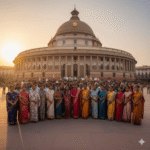India’s Balancing Act: Tradition Under Pressure in an Era of Constant Change
In the heart of Mumbai, a young professional scrolls through her phone while waiting for the morning train, pausing briefly at a quote from a spiritual leader on social media. The next moment, she’s absorbed by a work email. Across the country, a farmer in Tamil Nadu lights a lamp before a family deity, muttering a hurried prayer before heading to the fields. These snapshots of life capture a broader question confronting modern India: In the relentless pace and distractions of contemporary life, are we losing sight of the core beliefs that once defined us?
A Shift in Priorities
Reports and studies indicate a growing shift in how Indians engage with their beliefs:
- Decline in Ritual Practices: A 2021 Pew Research Center survey revealed that while 80% of Indians identify as religious, only 45% report engaging in regular prayers or rituals. Younger generations, in particular, prioritize career growth, education, and social mobility over religious practices.
- Rise of Secularism: The Lokniti-CSDS 2022 study found that 28% of urban Indians describe themselves as less religious than their parents, a trend driven by exposure to global lifestyles and a focus on individualism.
The Pull of Modern Life
Modernity, with its technological advancements and hyperconnectivity, has created a world where traditional beliefs are often sidelined:
- Digital Overload: With Indians spending an average of 6.5 hours daily online (as per a 2023 IAMAI-Kantar report), social media and digital entertainment have become dominant forces. Spirituality and reflection, which require quiet introspection, often take a backseat in this fast-paced, screen-dominated life.
- Work-Life Imbalance: A 2022 Monster Employment Index survey highlighted that 74% of Indian professionals report stress due to work-life imbalance. This leaves little time for engaging with traditional practices or spiritual exploration.
The Rise of Superficial Engagement
The commercialization of spirituality and the rise of “quick-fix” belief systems add another layer of complexity:
- Wellness Over Worship: Apps promoting mindfulness and self-care are replacing traditional religious practices for many. While these tools offer mental health benefits, critics argue that they dilute the depth of spiritual traditions.
- Social Media Religion: The use of platforms like Instagram to share religious quotes or participate in online rituals reflects a shift towards performative spirituality. The Pew Research Center notes that while 60% of Indians under 30 engage with religious content online, this engagement often lacks depth and consistency.
The Core Beliefs at Stake
As modern life pulls people in multiple directions, the foundational principles of Indian spirituality—compassion, community, and connection to the divine—risk being overshadowed. Sociologist Dr. Ananya Mehta explains: “Beliefs are not just about rituals or religion. They are about the values we live by. When life becomes a constant rush, even these values can be compromised.”
Signs of Resilience
Despite these challenges, there are indications that Indians are finding ways to reconnect with their core beliefs:
- Community Initiatives: Programs like the Art of Living Foundation and local cultural groups are helping individuals rediscover traditional values through workshops and retreats.
- Eco-Friendly Spirituality: Movements like eco-friendly Ganesh Chaturthi and green Diwali show how traditions are being adapted to align with contemporary concerns like environmental sustainability.
- Rituals in the Digital Age: Temples offering online darshan and virtual religious events are making it easier for people to stay connected to their faith amidst busy schedules.
Striking a Balance
Experts emphasize the need for balance between modern life and traditional values:
- Mindful Engagement: Incorporating small, meaningful practices—like daily gratitude or short meditations—can help individuals stay connected to their core beliefs without overwhelming their routines.
- Intergenerational Dialogue: Families must engage in conversations about the relevance and adaptation of traditions, ensuring that younger generations understand the significance of beliefs in a changing world.
- Education and Awareness: Schools and workplaces can play a role by fostering discussions on ethics, values, and cultural heritage, bridging the gap between ancient wisdom and modern realities.
Conclusion: Rediscovering What Matters
As India stands at the crossroads of tradition and modernity, the challenge lies not in choosing one over the other, but in integrating both to create a life of meaning and balance. Core beliefs, whether rooted in spirituality, morality, or community, are not relics of the past—they are guiding principles for navigating the complexities of the present.
In the words of Mahatma Gandhi: “There is more to life than increasing its speed.” Perhaps it’s time to pause, reflect, and reconnect with the beliefs that ground us amidst the noise of modern life. For it is in these quiet moments that the true essence of faith—and life itself—is found.


























